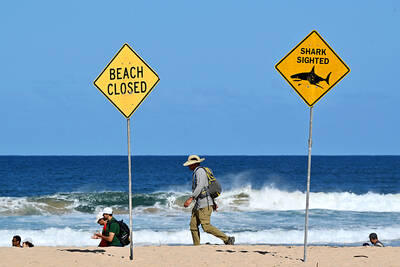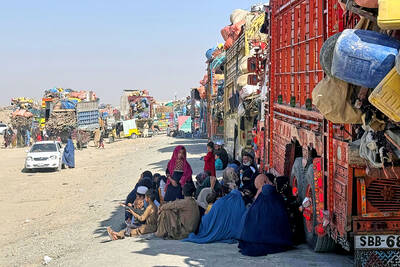A court yesterday ruled the Japanese military had a role in wartime mass suicides in Okinawa, rejecting a libel suit by former soldiers against Nobel laureate Kenzaburo Oe.
The suit was filed in August 2005 against Oe and the publisher of his 1970 book of essays Okinawa Notes, which mentioned how Japanese troops ordered islanders to kill themselves in 1945 rather than surrender to US invaders.
The Osaka District Court threw out the ¥20 million (US$200,000) suit by a 91-year-old former soldier and another soldier's family, as well as their demand that the book be suspended from publication, a court official said.
The military was deeply involved in the group suicides during World War II, the Osaka District Court said in a closely watched ruling.
The suit was one of the reasons the central government had cited last year for its controversial decision to change school textbooks to delete references to the military forcing islanders to commit suicides.
The 83-day Battle of Okinawa, the bloodiest in the Pacific war, left 190,000 Japanese dead, half of them civilians on the southern island chain.
While many perished in the all-out US bombardment, local accounts say mainland Japanese troops forced residents of Okinawa -- an independent kingdom until the 19th century -- to commit suicide rather than surrender.
Locals have said the troops even gave them grenades for suicides while nationalist academics have insisted that the suicide pacts were voluntary.
The central government's decision under former nationalist prime minister Shinzo Abe sparked furious protests in Okinawa, including a mass rally.
Abe stepped down in September.
Under pressure, the education ministry in December restored references in history textbooks to note that Okinawans "committed group suicides with the involvement by the Japanese military."
Oe, now 73, won the Nobel prize for literature in 1994 and is known for his pacifist views.
Also yesterday, Japan ordered schools to teach children to sing the national anthem in the latest controversial step to boost patriotism, a taboo since World War II.
The education ministry issued new education guidelines for children aged six to 15 to take effect in 2010 at the earliest.
At the moment schools teach the anthem as part of regular coursework but the new ruling emphasizes instruction "so that children can sing it," a ministry statement said.
Japan has been gradually embracing national symbols which were shunned by most except for nationalist activists in the decades since defeat in World War II.
Liberal teachers have led a campaign against the national anthem in Tokyo and other school districts that have required it to be played at school ceremonies.
The anthem, Kimigayo ("Thy Reign"), praises the emperor. Critics say it harks back to Japan's militarism under the Emperor Hirohito, who was considered divine during World War II.
The ministry also added a guideline saying that "love for our country and hometown, which has nurtured tradition and culture," should be part ot ethics classes.
Additionally, it asked that classes teach children the country's myths, which say the imperial family descended from the goddess Amaterasu. The story will be presented as myth.
The revision was done in line with a bill passed by parliament in December 2006 that patriotism be part of national education.
The parliamentary bill was a signature issue for Abe, an outspoken conservative who championed breaking post-World War II taboos.

With much pomp and circumstance, Cairo is today to inaugurate the long-awaited Grand Egyptian Museum (GEM), widely presented as the crowning jewel on authorities’ efforts to overhaul the country’s vital tourism industry. With a panoramic view of the Giza pyramids plateau, the museum houses thousands of artifacts spanning more than 5,000 years of Egyptian antiquity at a whopping cost of more than US$1 billion. More than two decades in the making, the ultra-modern museum anticipates 5 million visitors annually, with never-before-seen relics on display. In the run-up to the grand opening, Egyptian media and official statements have hailed the “historic moment,” describing the

SECRETIVE SECT: Tetsuya Yamagami was said to have held a grudge against the Unification Church for bankrupting his family after his mother donated about ¥100m The gunman accused of killing former Japanese prime minister Shinzo Abe yesterday pleaded guilty, three years after the assassination in broad daylight shocked the world. The slaying forced a reckoning in a nation with little experience of gun violence, and ignited scrutiny of alleged ties between prominent conservative lawmakers and a secretive sect, the Unification Church. “Everything is true,” Tetsuya Yamagami said at a court in the western city of Nara, admitting to murdering the nation’s longest-serving leader in July 2022. The 45-year-old was led into the room by four security officials. When the judge asked him to state his name, Yamagami, who

DEADLY PREDATORS: In New South Wales, smart drumlines — anchored buoys with baited hooks — send an alert when a shark bites, allowing the sharks to be tagged High above Sydney’s beaches, drones seek one of the world’s deadliest predators, scanning for the flick of a tail, the swish of a fin or a shadow slipping through the swell. Australia’s oceans are teeming with sharks, with great whites topping the list of species that might fatally chomp a human. Undeterred, Australians flock to the sea in huge numbers — with a survey last year showing that nearly two-thirds of the population made a total of 650 million coastal visits in a single year. Many beach lovers accept the risks. When a shark killed surfer Mercury Psillakis off a northern Sydney beach last

‘NO WORKABLE SOLUTION’: An official said Pakistan engaged in the spirit of peace, but Kabul continued its ‘unabated support to terrorists opposed to Pakistan’ Pakistan yesterday said that negotiations for a lasting truce with Afghanistan had “failed to bring about a workable solution,” warning that it would take steps to protect its people. Pakistan and Afghanistan have been holding negotiations in Istanbul, Turkey, aimed at securing peace after the South Asian neighbors’ deadliest border clashes in years. The violence, which killed more than 70 people and wounded hundreds, erupted following explosions in Kabul on Oct. 9 that the Taliban authorities blamed on Pakistan. “Regrettably, the Afghan side gave no assurances, kept deviating from the core issue and resorted to blame game, deflection and ruses,” Pakistani Minister of